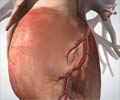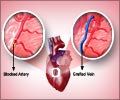A new study suggests that cognitive dysfunction among patients who undergo coronary artery bypass grafting (CABG) surgery disappears after eight weeks of surgery.

Researchers from Monash University and RMIT University, both in Victoria, Australia, periodically tested cognitive function in three sets of patients: 16 patients who underwent elective CABG surgery, 15 patients who underwent elective chest surgery for lung biopsies or lobectomies, and 15 non-surgical patients.
"Our study carefully controlled for a wide range of factors that can influence cognition, such as the residual effect of general anesthesia, familiarity with testing procedures during retesting (practice effects), general intelligence, age, education levels, emotional state, and levels of pre-existing impairment," said Kathryn M. Bruce, the primary author of the study.
The researchers found that CABG patients performed worse on every subtest prior to surgery, and these disparities continued following surgery. Anxiety, depression, and stress were associated with impaired cognitive performance in patients in the two surgical groups 1 week after surgery.
At 1-week post-operation, 44% of CABG patients and 33% of surgical control patients were significantly impaired; however, by 8-weeks post-operation nearly all patients had recovered to pre-operation levels with 25% of CABG patients and 13% of surgical control patients improving beyond their pre-operative performance.
The researchers also found that even though the surgical groups showed impairment, when individual performance within these groups was examined, more than half of the patients were unaffected by the surgery.
Advertisement
"Previous research may have overestimated the effects of cardiac surgery on cognition. Our data indicate that cardiac bypass surgery has a low likelihood of causing permanent cognitive deficits," said senior author Stephen R. Robinson, PhD. "Cognitive changes that occur immediately after surgery are likely due to confounding factors and will generally resolve within a few months."
Advertisement
In an invited commentary appearing in the same issue, Ola A. Selnes, PhD, from The Johns Hopkins University in Baltimore, noted that patients who are worried about adverse neurological outcomes, such as cognitive decline, can be reassured that post-operative cognitive decline is significantly less common than was reported in the past.
"The study by Bruce and colleagues suggests that identifying and treating pre-operative depression may be one approach to minimizing the risk of post-operative cognitive decline," he said.
"Patients can be told that since there is no evidence that conventional CABG surgery-known as on-pump CABG surgery-is associated with worse neurological outcomes than other types of revascularization, such as percutaneous catheter intervention or off-pump CABG surgery, the choice of procedure should be guided by what is good for the individual patient as opposed to the risk of adverse neurological outcomes," said Dr. Selnes.
For a copy of the study and invited commentary, contact Cassie Brasseur at 312-202-5865 or [email protected].
Founded in 1964, The Society of Thoracic Surgeons is a not-for-profit organization representing more than 6,600 cardiothoracic surgeons, researchers, and allied health care professionals worldwide who are dedicated to ensuring the best possible outcomes for surgeries of the heart, lung, and esophagus, as well as other surgical procedures within the chest. The Society''s mission is to enhance the ability of cardiothoracic surgeons to provide the highest quality patient care through education, research and advocacy.
The Annals of Thoracic Surgery is the official journal of STS and the Southern Thoracic Surgical Association.
Source-Newswise











